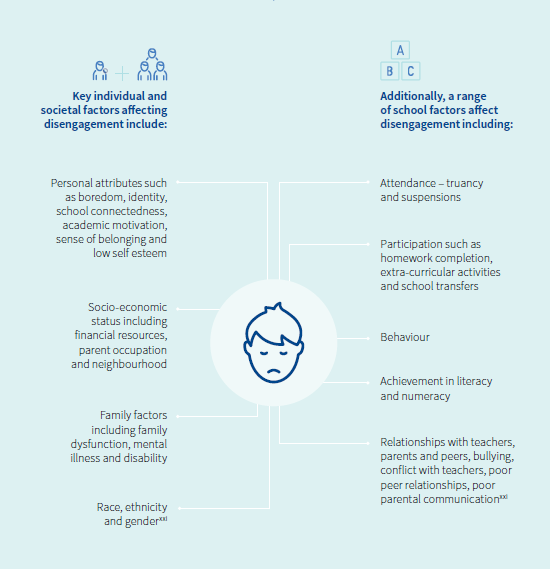There is a multiplicity of causes of disengagement, which can lead to detachment from school, from personal to school level factors, and often a combination of both.
The reasons for non-attendance are similarly varied and complex, ranging from illness to caring obligations, stress and fear of bullying. Key economic factors, and parent and child risk factors often relate to children persistently missing school.
The family and community factors influencing attendance are well known. These include socio-economic status, regionality, parental labour force status and educational attainment, homelessness, transience or living in out-of-home care, Aboriginal or Torres Strait Islander status, refugee background, family breakdown/relationship issues and family violence.
A range of personal factors can influence young people’s attendance. Factors such as physical and mental health, disability and behavioural issues play a large role in attendance. Young people are acutely aware of the perilous youth job market and are feeling more stressed than before. The 2018 Mission Australia Youth Survey found that more than 40 per cent young people were worried about how they coped with stress, a third were either extremely or very concerned about school or study problems (33.8 per cent), while around three in ten were concerned about mental health (30.9 per cent) and body image (30.4 per cent). These worries apply to young people in all socio-economic groups.
Young people with caring burdens or who are pregnant may struggle to attend school. Young people with offending behaviour or substance issues are also likely to attend less, and to leave school early. School-related factors include learning difficulties, relationships with peers and teachers, lack of engagement in education and lack of student agency.
Young people may often experience multiple risk factors, which may be interdependent. For example, family breakdown may be a factor in substance misuse, which may itself contribute to other problems such as offending behaviour. The impact of risk factors on engagement, health and wellbeing will vary between individuals and depend on their levels of resilience and protective factors such as support from a trusted adult.
